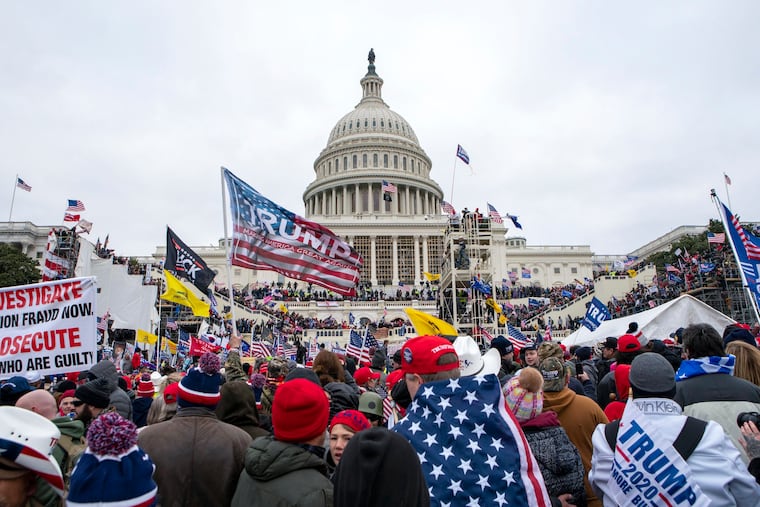Former Philly politico Jamie Fleet told Jan. 6 committee that preparations for election challenges started in summer 2020
Fleet’s testimony also included a dramatic description of the chilling moments for House staffers as insurrectionists attempted to batter their way into the congressional chamber.

Testimony from a former Philadelphia politico and top adviser to House Speaker Nancy Pelosi described how Democrats were worried about former President Donald Trump’s effort to challenge the results of the 2020 election months before Americans cast their ballots.
The account, delivered by Jamie Fleet to the House select committee investigating the Jan. 6, 2021, attack on the U.S. Capitol, was made public Tuesday evening.
Fleet’s testimony included a dramatic description of the chilling moments for House staffers as insurrectionists attempted to batter their way into the congressional chamber.
Fleet also said that the chief of the Capitol Police told him a day before the riot that law enforcement had the situation under control and could quell unrest with “one phone call” to the National Guard — nothing like what actually occurred during the violence on Jan. 6.
Who is Jamie Fleet?
Fleet has strong ties to the Philadelphia region. A Gettysburg native, Fleet spent several years as an assistant to former Pennsylvania Gov. Ed Rendell, served as senior adviser to former City Controller Jonathan Saidel, and was a campaign manager for U.S. Rep. Bob Brady before serving in the House Administration Committee.
As Democratic staff director of that committee, Fleet was responsible for a team that communicated with the Capitol Police Board leading up to Jan. 6.
Also a top aide to Pelosi since 2019, Fleet was the highest-ranking Hill staffer to testify to the select committee when he was interviewed this fall.
» READ MORE: What the Jan. 6 report says about Doug Mastriano, Scott Perry, and other key Pa. Republicans
‘Substantive work’ months before 2020 election
Fleet described in testimony that in the months leading up to the November presidential election, his office prepared for the possibility that House Republicans would object to the certification of certain states, including Pennsylvania, Georgia, and Arizona.
Fleet’s office has oversight over federal elections, in addition to coordinating the Capitol’s back-of-house operations.
“The Committee on House Administration maintains oversight of federal elections and regularly prepares internal information for any potential election objections during the certification process,” said a spokesperson from Fleet’s office via email on Wednesday. “Whether or not members object to certain states’ certifications, the committee prepares state specific election information to provide appropriate guidance.”
Fleet’s testimony revealed that House Democrats were actively preparing to counter challenges to the election results months in advance of the certification.
“I was watching President Trump very methodically lay a basis for an argument that the election, if he was unsuccessful, was improperly decided,” Fleet told the Jan. 6 committee.
Fleet told the committee his team began studying the Electoral Count Act and the 12th Amendment in summer 2020 and was preparing to brief House members on election law in key battleground states.
Fleet said that in the hours before rioters breached the Capitol, he was organizing Democratic House members to counterargue potential GOP challenges.
‘All hands on deck’
Central to Fleet’s testimony were descriptions of a Jan. 5, 2021, briefing between his staff and members of the Capitol Police Board, including former Capitol Police Chief Steven Sund and former House Sergeant at Arms Paul Irving.
Fleet testified that Sund’s briefing detailed preparations for Trump’s planned rally at the Ellipse, two miles from the Capitol complex, but did not mention plans for an attack on the Capitol complex.
Despite Sund saying the situation would be “all hands on deck” for his officers, Fleet said Sund never mentioned that the Capitol itself was considered a target.
Fleet also testified that Sund didn’t mention plans to staff civil disturbance units or officers trained in violent protests, and that the chief assured him that the National Guard was “a phone call away.”
However, calling in the Guard on Jan. 6 would require approval between multiple parties, and units did not arrive at the Capitol until after 5 p.m. — well after violence had subsided.
‘Theater of violence’
Fleet told the committee he had a “feeling” as he walked through his Capitol Hill neighborhood toward the complex on Jan. 6, as Trump rally-goers filtered through the neighborhood.
By around 2 p.m., a mob breached the Capitol Police’s outer barrier of defense. Fleet found himself on the floor of the House among members of Congress, and described hearing rioters banging at the back door.
“There was dramatic, dramatic pounding on that door,” Fleet recalled, adding, “It was a distinctive sound that I’ll never forget.”
Fleet described a “theater of violence,” which he observed through the window of an office while meeting with Pelosi’s chief of staff, the House and Senate sergeants in arms, and two staffers for Sen. Mitch McConnell (R., Ky.).
Fleet said members of McConnell’s staff expressed hesitation about calling the National Guard and explained that there would need to be an “additional step” before the senator would agree to calling in the Guard.
“There was an observation that this would not be normal — expressed on the part of Mr. McConnell’s team — this would not be a normal thing that would happen,” Fleet said.